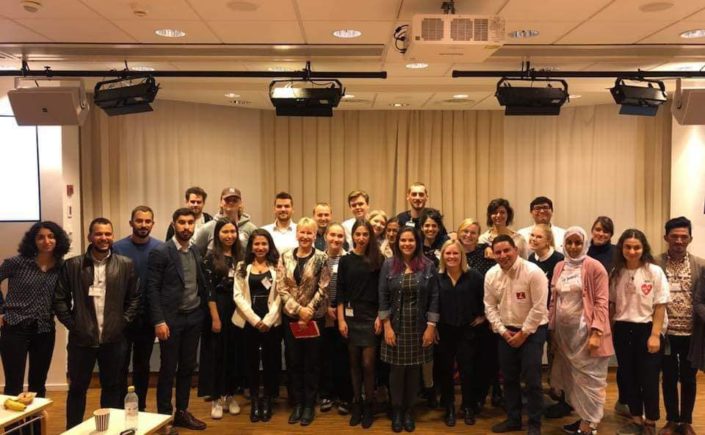Over the weekend 50 young socialists and social democrats from four continents assembled in Stockholm to discuss and debate about the ways of achieving decent work for youth on a global level. The seminar was arranged in cooperation between the International Union of Socialist Youth IUSY, the Swedish Social Democratic Youth League SSU and Olof Palme International Center. The programme consisted of discussions on collaborative economy and entrepreneurship, decent work and social protection in developing countries, improving the working life through trade unions and political cooperation, debating over the Swedish initiative “Global Deal”, role of free trade in poverty reduction, economic justice in north-south relations, migration and decent work as well as tax evasion and the ways of tackling it.
In the discussion about collaborative economy and entrepreneurship the participants debated with experts on how the new forms of work affect our societies and the working life. Platform and shared economy bring both opportunities and challenges. The problems take various forms such as leaving the employees responsible for their own social security, safety and income as well as social support, yet the agenda setting of the discussion has been problematic. We believe that the question should not be whether people can have an insecure low paying job instead of no job at all, but how we can ensure decent work in the new economic platforms as well.
We call for fair regulation of the work that is done in the context of platform economy. The workers rights can be ensured through tripartite system negotiation. The implementation of these regulative schemes must be effective and flexible for the working people. Especially young people must get help and information in order for them to understand their rights as employees as well as to organize effectively. In order to ensure a fair and fact based debate, we need to ensure that social media platforms follow regulations and human rights instead of promoting fake news.
Regarding the decent work and social protection in developing countries a panel took place with international participants from the political organizations in Colombia as well as Swedish trade union and development aid experts. We conclude that as a part of globalization, transnational companies have settled and gained undemocratic power in many less economically developed countries, which has led to weakening of workers rights. Multinational companies must be held accountable using binding regulations and critical financial penalties in case of violation. One of the biggest challenges regarding workers rights in the developing countries has been to implement effective social protection policies – partly due to the global tax evasion.
The role of consumers outside the developing countries is also worth mentioning. Thanks to some certification systems, consumers now have a limited possibility to actively avoid consuming products of companies that are known to neglect workers’ rights in the different parts of the production chain. However the improvement of workers rights is primarily a political decision and can not be achieved only through consumer choices.
To make real change on the ground we need to strengthen and more forcefully implement international and national rule of law as well as legislation for decent working conditions. We need international support to trade unions on both national and local level, renegotiating international trade agreements and replacing them by agreements founded on the principles of international solidarity. Initiating social dialogue between the unions and the employees can’t play a key role, as the non-legislative work in the promotion of workers rights is as important as the legislative one.
We believe that decent work for youth is in the heart of the principles and values of the left and that we need a strong campaign to fight against the labour market inequalities and for better laws, policies and regulations that support decent working conditions. In this fight we need to understand how regional situations differ and develop in each country.
In our discussion, we wanted to focus on three priority areas where the improvement is needed the most – the gender gap, the situation of people who don’t work or study as well as the conditions of the people who work but still remain poor. The solutions are various. Primarily, we must acknowledge the existence of a gender gap on the labour market, starting from early age. In order to change the unequal situation of the genders we need to understand and communicate the phenomena leading into the gap in education, culture and legislation. Secondly, we must fight against the exclusion of the millennials. For example, many young people who are outside studies or working life get pregnant early, which even more excludes them from education and labour market. Continuous, free and high quality education is the key element in answering the challenge of exclusion. The mechanisms of strengthening social rights – from food to books – are also a part of the solution. Thirdly, we must ensure the decent work and employment for youth. The maximization of the profits is based on the exploitation, bad salaries and weakening of labour rights. For sustainable change, we call for unionization and collective bargaining as well as strong support of the national governments for inclusive growth.
Based on the abovementioned discussions, debates and conclusions, we as young progressives from all over the world demand a global perspective on the questions of fair work. The solutions must be internationally sustainable and not limited to the western industrialized countries. Only through unionizing and standing together for our political aims across the borders can we stop the race to the bottom in worker’s rights. We call for international solidarity, equal opportunities and abolishing discrimination. We stand together – all over the world to change it!

